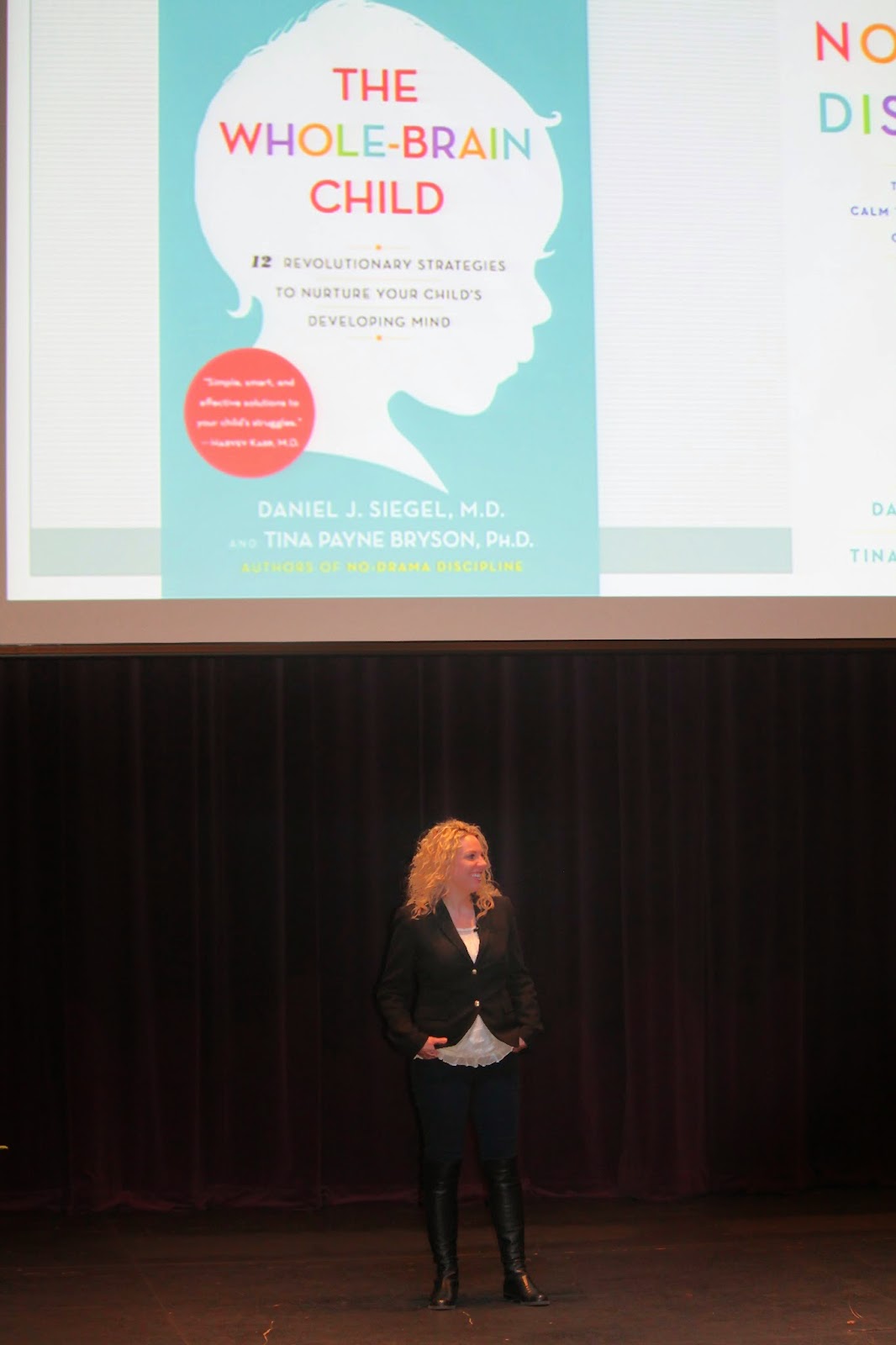"The Power of the Teenage Brain: Understanding Teen's Emotions, Relationships and Decisions"
By Dr. Tina Payne Bryson
By Dr. Tina Payne Bryson
The Glenbard Parent Series: (GPS) Navigating Healthy
Families, presented "The Power of the Teenage Brain: Understanding Teen's
Emotions, Relationships and Decisions" with renown adolescent psychotherapist
and bestselling author Tina Payne Bryson PhD at 7:00p.m. Wednesday, March 11, at
the College of DuPage McAninch Arts Center (MAC).
- A note from Dr. Payne Bryson
- Parent's Take-Away
- Summary: Bryson Explains Why the “Whole Brain” is Greater Than the Sum of it's Parts
Also, remember that you can read articles about kids and parenting at my website, TinaBryson.com.
Warmly,
Tina
Click here for my website, where you can subscribe to my
newsletter.
Lynn Dugan, Glenbard West parent shares her five take away's-
 Tonight's Glenbard Parent Series program was a "Wow!" In this
terrific session there were so many great points-
Tonight's Glenbard Parent Series program was a "Wow!" In this
terrific session there were so many great points-- Discipline equals teaching and skill building. As parents, we can have high expectations/firm standards AND be emotionally nurturing and available.
- As parents, we can turn our teens’ struggles into opportunities for positive change. Look BEHIND the behavior (chase the WHY, behind the behavior).
- An important strategy for dealing with an hyper emotional or upset teen is to CONNECT and REDIRECT. Connect first emotionally, then when they have calmed down- offer reason, discipline and strategies. Teens have to be in a receptive state (not a reactive state) to receive discipline and redirection.
- ENGAGE, DON’T ENRAGE
- Teens need to be safe, secure, seen and soothed. How am I doing? I need to ask my kids, 'Do you think I am on your side?'
BRYSON EXPLAINS WHY THE “WHOLE BRAIN” IS
GREATER (AND BETTER TO USE) THAN THE SUM OF ITS
PARTS
 Tina Payne Bryson Ph. D., coauthor
of The Whole-Brain Child (with Dan
Siegel MD), wants parents to better understand how our
brains work. Once we do we can optimize our cognitive abilities when dealing
with our adolescents and “discipline” them with the true meaning of the word in
mind.
Tina Payne Bryson Ph. D., coauthor
of The Whole-Brain Child (with Dan
Siegel MD), wants parents to better understand how our
brains work. Once we do we can optimize our cognitive abilities when dealing
with our adolescents and “discipline” them with the true meaning of the word in
mind.
In her
presentation March 11th at the College of DuPage McAninch Arts
Center for the Glenbard Parent Series Bryson used several humorous antidotes to
illustrate how the left hemisphere of the brain, that which governs logic,
lineal thinking, linguistics and literal interpretation, operates (or should
operate) in conjunction with the right hemisphere of the brain, that which governs
emotional interpretation, non-verbal cues, whole-picture-context thinking, body
language and random assortment of information.
When
adolescents are having an “emotional tsunami,” parents often respond trying to
use logic. Bryson explains why this doesn’t work. When emotions “run high”
there is “hyper-arousal.” Kids become defensive and can’t think clearly and
can’t even hear what you’re saying.
When
responding to an upset adolescent, Bryson recommends using “connect and
redirect.” This technique promotes the integration of the left and the right
brain. To “connect” with the child, a parent should use a relaxed posture and
calm voice. This will not only calm down the child, but the parent as well. Use
non-verbal touch to comfort and then empathy to acknowledge the child’s
feelings. This is right brain thinking.
To “redirect” a parent should ask open-ended
questions and guide the child to solutions, planning, logical explanations and
boundary setting. This is left brain thinking.
Bryson
reminds us that the true definition of the word discipline is “to teach” not
“to punish.” When your adolescent is “acting out” ask yourself questions? Why
did my teen act this way? Be curious and look behind the behavior.
Remember.
“Struggles equal opportunities.” All behavior is a form of communication.
Adolescence is not just about raging hormones. The experiences teens go through
cultivate new great abilities.
In
adolescence the brain is becoming specialized. As Bryson puts it, “Where
attention goes neurons fire. Where neurons fire, the brain rewires.” Parents
can play a role in how their teen’s brain develops. Teaching them to integrate
both sides of the brain will give them life skills larger than the sum of their
parts.
Suzanne Burdett is a freelance
writer and a Glenbard parent.
